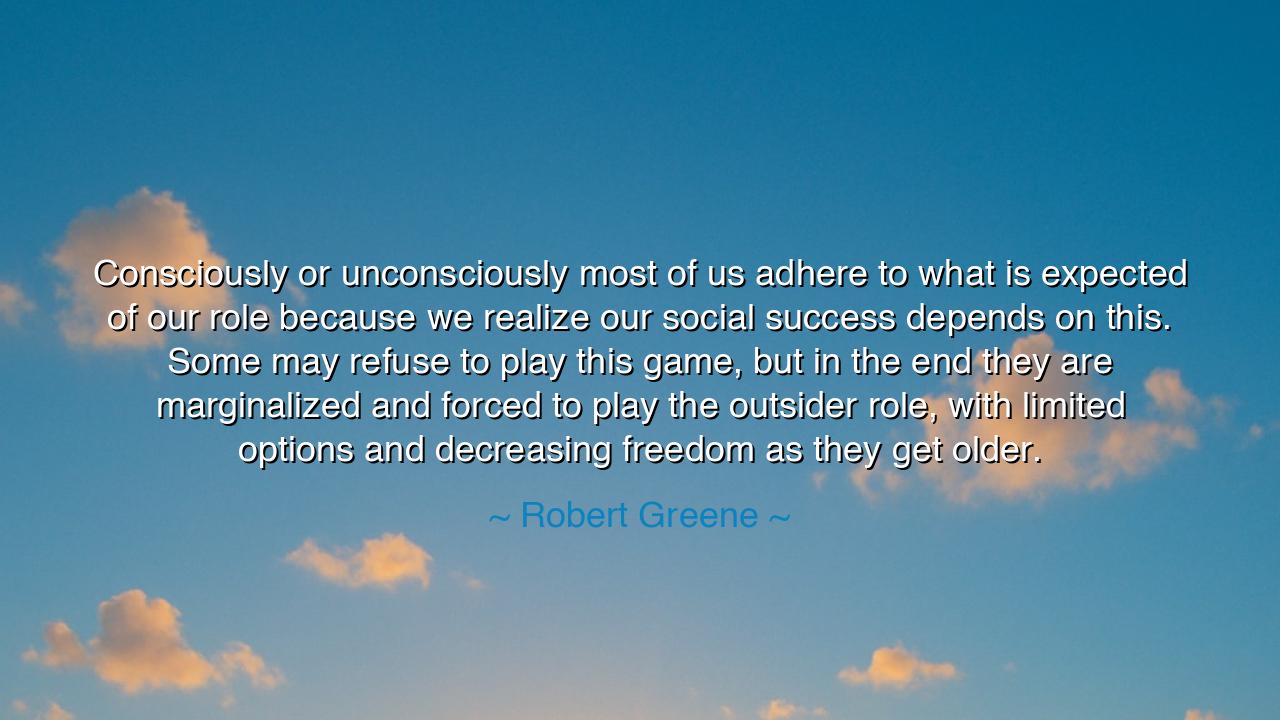
Consciously or unconsciously most of us adhere to what is
Consciously or unconsciously most of us adhere to what is expected of our role because we realize our social success depends on this. Some may refuse to play this game, but in the end they are marginalized and forced to play the outsider role, with limited options and decreasing freedom as they get older.






Hear the words of Robert Greene, who declared: “Consciously or unconsciously most of us adhere to what is expected of our role because we realize our social success depends on this. Some may refuse to play this game, but in the end they are marginalized and forced to play the outsider role, with limited options and decreasing freedom as they get older.” These words are heavy with the wisdom of the ages, for they reveal the unspoken laws that govern human societies. They tell us that the world is a theater, each of us an actor upon its stage, and that our roles—whether chosen or thrust upon us—are bound with invisible threads to our success or failure in the eyes of others.
The ancients knew this truth and spoke of it in parables. In the Roman forums, a senator wore the toga not merely for warmth, but as a symbol of authority, a costume of respect. A soldier bore his armor not only for war, but to signify his rank and loyalty. To discard these roles was to invite suspicion, to step outside the order of society and risk banishment. So too today: the way we act, speak, and present ourselves is tied to the expectations of our station. To ignore this is to play a dangerous game, one that often ends with the lonely fate of the outsider.
Consider the story of Socrates, the philosopher of Athens. He refused to conform to the expected roles of his society, questioning leaders, challenging traditions, and exposing the ignorance of the powerful. Though he sought wisdom, not destruction, his refusal to “play the game” of roles led to his trial and death. He drank the hemlock, choosing principle over conformity. His legacy is immortal, yet his freedom in life grew ever smaller until it vanished entirely. Thus Greene’s words find their proof: the outsider is often marginalized, bound by shrinking choices, and cast into exile from the comfort of society.
Yet not all who accept their roles are cowards, nor are they hypocrites. To wear a mask need not mean to lose oneself. The Japanese speak of having three faces: one shown to the world, one to family, and one kept only for the self. To honor one’s public role can be wisdom, for it allows one to move in the world with ease, to secure opportunities, and to preserve the freedom that comes from social harmony. To rebel against every expectation is not bravery but folly, for it strips away the very structures that grant us influence and choice.
But Greene’s words are also a warning: do not deceive yourself into thinking the game does not exist. Whether consciously or unconsciously, we all play it. The wise man sees the stage clearly, learns his lines, and uses them with skill. The fool denies the stage altogether, only to find himself cast out into the shadows, where the power to act dwindles. To live well is to know the rules of society, to understand the role expected, and to choose—at times subtly, at times boldly—how to play it to your advantage.
To you who hear this teaching, take it to heart: do not scorn the game of roles. Learn it, master it, and use it to preserve your options and freedom. Ask yourself: what is expected of me in this place, in this time? How can I fulfill enough of this role to gain trust, while still keeping my true self alive within? Balance is the key: too much rebellion leads to exile, too much conformity leads to the loss of identity. The art is in knowing when to blend and when to break away.
Practical wisdom follows: in your work, honor the customs that secure stability. In your friendships, respect the expectations that build trust. In your ambitions, master the symbols, gestures, and appearances that persuade others of your worth. Yet always keep a hidden sanctuary for your true self, a space where no role is needed, where you are free from the gaze of society. In this way, you may prosper without becoming hollow, and you may endure without being crushed by exile.
Thus, remember Robert Greene’s words: the world is a stage, and social success depends upon the roles we play. To deny this is to be blind. To master it is to hold power. And to balance it with inner truth is to live wisely and freely, even within the theater of life.






AAdministratorAdministrator
Welcome, honored guests. Please leave a comment, we will respond soon